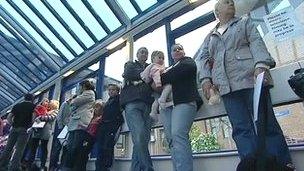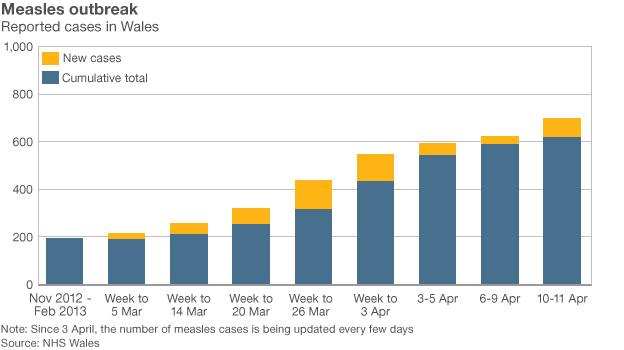Wales measles: Chief medical officer says not too late for jab
- Published
Nearly 700 people in and around the city have caught the virus since the outbreak began in November
Wales' chief medical officer has urged parents to have their teenage children vaccinated against measles and insisted: "It's not too late".
Dr Ruth Hussey says teenagers are the main focus on tackling the epidemic centred on Swansea, which has hit nearly 700 people since last November.
Her call came as about 2,000 pupils could be given the MMR jab in schools this week to try to stop the spread.
Letters are going to parents ahead of the sessions, which start on Wednesday.
"A group that has missed out in the past is the group we really need to get to," Dr Hussey told BBC Wales.
"We really want to focus our efforts in trying to encourage those teenagers to come forward and have the vaccination."
As well as Swansea, she said there were "pockets right across Wales" where historically there had been a low uptake of vaccine, with older children in particular vulnerable.
Take-up for the MMR vaccine dropped significantly in the late 1990s when research by Dr Andrew Wakefield - which has since been discredited - raised concerns over the jab, linking it with autism.
Subsequent media coverage of parents' worries have also been blamed for the low vaccination uptake.
Dr Hussey said the group of teenagers officials are targeting are those whose parents at the time chose not to have the vaccination.
"That was a decision based on what they were hearing at the time," she said.
"Thankfully the evidence is clear and we should base our decisions on the evidence that's available and I would strongly urge those parent to talk to the health professionals if they're not sure still.
"But the vast majority of parents now of pre-school years are all coming forward for the vaccine. So I just reiterate it's not too late to have the vaccine, so please consider having it."
There are fears measles could spread across Wales and as a result, health boards laid on special drop-in MMR vaccination clinics at hospitals across south Wales on Saturday, which were attended by about 2,500 people.
Ahead of the sessions, Public Health Wales (PHW) had estimated that more than 40,000 children had not had any recommended MMR (measles, mumps, rubella) jabs across Wales, at least 6,000 of them in Swansea.
"We don't want to see people prioritising what diseases they get immunised against"
Another 30,000 children across Wales are thought to have had only one of the two recommended vaccinations, offering about 95% protection.
The vaccination programme at the five schools - beginning as pupils return after the Easter holiday - aims to target the 11-18 age group.
Abertawe Bro Morgannwg University Health Board said nurses would be vaccinating at schools with the highest numbers of pupils at risk of catching measles.
They are:
Bishop Vaughan Catholic School, external, Swansea: Vaccinating on Wednesday and Thursday - approximately 527 pupils at risk of catching measles.
Bishop Gore Comprehensive School, external, Swansea: Vaccinating on Wednesday and Thursday - approximately 488 at risk.
Bishopston Comprehensive, external, Swansea: Vaccinating on Wednesday - approximately 446 at risk.
Morriston Comprehensive, external, Swansea: Vaccinating on Thursday - approximately 327 at risk.
Cwmtawe Community School, external, Neath Port Talbot: Vaccinating on Friday - approximately 245 at risk.
Letters will be given to the parents of children who, according to records, are believed to need MMR vaccinations ahead of the sessions.

People queued for the drop-in MMR vaccination clinic at the Princess of Wales Hospital, Bridgend
The health board, external has also set up pages on its website for parents to read information about the programme and to download consent forms. More schools will follow in the weeks ahead.
Up to date information on measles data and frequently asked questions, external have also been published.
Dr Sara Hayes, Abertawe Bro Morgannwg's director of public health, said there was no sign of the outbreak slowing down, and she did not expect it to peak "for another week or so".
Cases 'could double'
"Children and young people who have not received the full course of MMR are at high risk of catching measles, and there is no doubt it is a horrible disease," she said.
"I would urge parents whose children need to have MMR to ensure they take advantage of the vaccination sessions at schools."
She said the health board had "simply chosen the biggest schools first, with the biggest number of susceptible children in them.
"That's bought us time to plan out the rest of the schedule and we'll be announcing the schedule some time this week."
"The UK news media collectively dropped the ball over MMR"
She said there was "so much confidence in MMR now - there's no reason to withhold it from your child and it's never too late to have it".
Ryan Davies, head teacher of Bishop Gore Comprehensive, added: "Not only is the health of pupils at risk if they are not fully vaccinated, but if they fall ill they are likely to miss important exams in the coming weeks, as there is currently no sign of this measles outbreak receding."
The number of cases in the outbreak has now officially reached 693.
Although the epidemic is based in Swansea, cases continue to be reported across Wales. Officials have also raised concerns about the number of cases in Powys, and warned that the number of people diagnosed with measles could "easily double", with the epidemic possibly lasting until the school summer holidays.
Dr Marion Lyons, director of public protection at PHW, has also warned that a death was inevitable if parents did not take action to vaccinate children.
Speaking on BBC current affairs programme The Wales Report, she said she wanted to see urgent action taken to vaccinate children over the next month, especially as the disease is more likely to spread as they return to school.
Measles is caused by a virus spread in droplets and is easy to catch by those who have not been vaccinated.
Typical symptoms of measles include fever, cough, conjunctivitis and a rash. Complications are quite common even in healthy people, and about 20% of reported measles cases experience one or more complication.

- Published15 April 2013
- Published15 April 2013
- Published14 April 2013
- Published14 April 2013
- Published13 April 2013
- Published12 April 2013
- Published11 April 2013